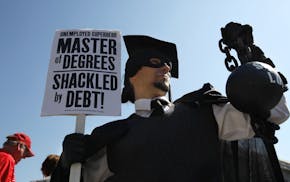I couldn't see Charlie Weaver, but over the phone I could almost hear him glowing.
"I am doing great," he said Thursday morning. "It has been a great week."
Weaver, a former Republican state legislator who is executive director of the Minnesota Business Partnership, gave voice to the sentiment much of corporate America felt Wednesday. The Democrats had lost control of the U.S. House, the Minnesota House and Senate, and state capitols around the country, and President Obama had donned sackcloth and ashes and rued being perceived as anti-business.
"Perceived?" Weaver asked, incredulously. "It was real. Many of our members met with him at the White House to talk about energy, health care, banking reform. The president's attitude was very condescending."
Weaver's membership includes the CEOs of the state's 100 largest companies, but some of those CEOs and others declined a similar opportunity to publicly savor Tuesday's election results. Requests for interviews from state manufacturing, health care and financial service firms were met with silence or a polite "no, thanks." Too busy, blah, blah, blah.
And maybe too smart. While the election brings business immediate and measurable relief on a number of issues both at the federal and state level, perhaps business leaders also recognize the folly of assuming it represents a sharp turn back to the loose-oversight, laissez-faire days of the past.
Obama's anti-business label is not entirely fair. The United States had already experienced 12 straight months of job losses by the time he was sworn in, and his administration deserves some of the credit for ensuring that the Great Recession did not turn into something worse.
The investment in General Motors saved hundreds of thousands of jobs, and in the end the Troubled Asset Relief Program will end up costing taxpayers far less than the generous grants and tax breaks provided to small businesses over the past year.
The Dow Jones industrial average was near 8,000 when Obama assumed office, and it closed at 11,188 on Tuesday -- a gain of almost 40 percent in less than two years.
But the forced march toward a health care bill, other proposed legislation and the congressional show trials of bank executives, health care executives, oil company executives and others eroded whatever goodwill existed between Obama and Corporate America. A poll by Bloomberg found that 77 percent of the people who subscribe to its financial news service terminals considered Obama "too anti-business."
Financier Irwin Jacobs, whose business interests range from a retail liquidation company to yachts, thinks Tuesday's election restores a much-needed brake on the worst impulses of the Democrats.
"I am not a die-hard Republican. I consider Bill Clinton to be one of the greatest presidents we've ever had," Jacobs said. "But there is a clear sense of relief among the people I've talked to. Washington got a wake-up call that we want checks and balances. Having them will make businesses feel more confident."
On the federal level, some of the things businesses worried about most now will likely go away, such as the languishing union card check legislation, a carbon tax and efforts to tax corporate profits earned abroad. A bill by the House to impose tariffs on some Chinese goods will likely die, but long-stalled free-trade agreements with South Korea and other countries will get a jolt.
Outright repeal of Obama's two biggest legislative achievements -- health care and Wall Street reform -- is unlikely, but Republicans now stand a better chance of softening the impact of many of the rules and regulations for both, which have yet to be written.
"We'll be watching that process very closely," said Noah Wilcox, president and CEO of Grand Rapids State Bank.
In Minnesota, Republican control of both the House and Senate means that even if Mark Dayton becomes governor, he can forget about raising the income tax rate on Minnesota's wealthier residents or eliminating the research and development tax credit. And business groups may realize their goal of reducing Minnesota's corporate income tax rate of 9.8 percent, the fourth-highest in the country.
Weaver believes that can be done despite a projected deficit of $6 billion, and without harming education or other things critical to Minnesota's competitiveness in the global economy.
"We now have a House and Senate that is prepared to engage and willing to talk about thinking differently about the delivery of services," he said. "They're very aware that Minnesota is barely competitive in the global economy. If it ends up being Gov. Dayton, I know he shares that feeling, and I think they are open to innovative thinking."
If there's one lesson to be taken from Tuesday's vote, it's that the new crop of legislators won't get a lot of time to prove themselves.
Americans are scared about their economic security and may not like big government, but they are none too fond of big business, either. A survey by Rasmussen late this summer found that 70 percent of Americans believe that government and big business work together against the interests of consumers and investors.
Americans know that Wall Street and the banks are responsible for the foreclosure crisis. They blame the Gulf oil spill on BP, not Obama. They may not like Obamacare, but they're not enthralled with health insurers, either. They resent the fact that corporate profit and pay is going up, but that jobs are going overseas.
Republicans didn't win, but change did. Time will tell if this is change voters can believe in.
ericw@startribune.com • 612-673-1736

Wieffering: Time to get over debit card fees
For Thrivent and others, warnings were there

With billions in sales, some co-ops are big business
